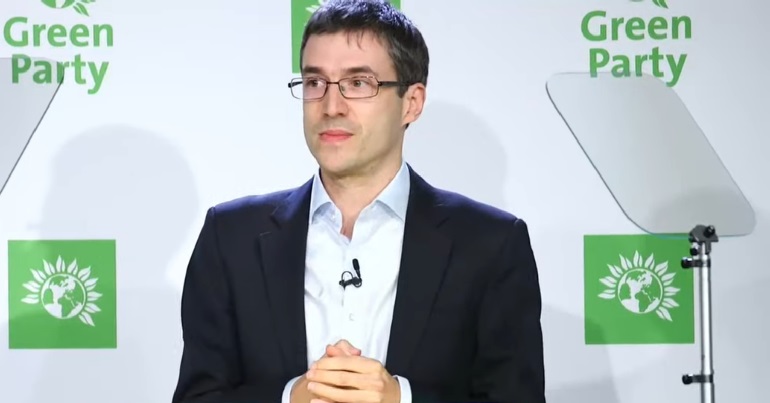Three Things about Cameron’s Credit Card Speech
David Cameron is giving his conference speech this afternoon. The heavily trailed message is that individuals should pay off debt, including credit cards. As Tim Hardy has pointed out credit cards play an important role in the story that the Tory party has been telling about the economy. But this speech gives a new dimension to the credit card myth. It moves the story from being about how the nation’s credit card is at its limit to being a broader attack on debt.
This has three important outcomes:
1. Cameron is broadening the blame for the crisis to the public
By suggesting that we all pay off our credit cards and our debts more broadly, Cameron is spreading the blame for the crisis from his previous target of public spending and ‘Labour mis-management’. At first the Tories used a crisis caused by a rampant finance sector to attack public spending. What was needed was not better regulation of financial capital, a move away from a speculative economy or a more equal society. What was needed was a wholesale attack on the poor.
Given that the US Federal Reserve and Bank of England used credit as a substitute for improvements in wages and standard of living between 2000 and 2007 it is unsurprising that many households have considerable debts. By deliberately stoking a house price bubble the US and UK governments enabled people to borrow against the value of their houses. This offset a real-terms stagnation in wages and standard of life.
For the Tories now to blame the population for an economic policy that they never criticised until the 2007 banking crisis is not just hypocritical, but utterly cynical.
2. Cameron doesn’t care if the economy picks up
A strong element of this government’s programme has been disaster capitalism, the Shock Doctrine. Using Milton Friedman’s maxim that “only a crisis—actual or perceived—produces real change” Cameron and Osborne have used the economic downturn to force through the destruction of the NHS, massive cuts in welfare and a host of other ideological attacks on the notion that those who have enriched themselves at society’s expense have any duty to those who they have exploited.
The current UK economy is dependent on debt-fuelled growth to function. That’s not the right way to run an economy, of course, and many of us would prefer a shift away from debt-fuelled consumption. But Cameron isn’t one of those. He’s every bit as committed to refloating the old economic model as the last Labour government were, however damaging it is for people’s lives.
The current economy depends on people spending money on consumer goods and services in order to keep employment up. If people stop spending money in order to pay off debts less money will be spent on goods and services. The people working to provide those goods and services will lose their jobs. This in turn means that the workers who have lost their jobs will spend less money, exacerbating the job losses. This is the beginning of a vicious circle.
Labour wants to stimulate consumer demand by cutting VAT and making fewer and less cuts. While this is not the Green solution to our economic situation, it will at least help to refloat the old economic model.
But unlike Labour he doesn’t seem to want to use the Government’s economic power to refloat the economy. Instead he seems content with an ongoing economic slump. Is this because he sees an ongoing crisis as a way to continue the crisis capitalist approach to dismantling the welfare state and public services?
It would certainly make sense. If the slump continues, so more and more cuts can be justified. There’s no way the Tories would have got away with their attack on the NHS unless there’d been a crisis. So continuing the crisis in a time when the public still seem to blame Labour looks like a low risk way to continue the neo-liberal attack on public services, the welfare state and on everyone who’s not a multi-millionaire.
3. The credit card myth must be rebutted soon
The credit card myth is already pervasive, and Cameron’s continued use of it, despite strong criticism shows that it has real resonance with the electorate and perhaps more importantly the media. In the 1930s the ‘paying off the credit card’ approach deepened and lengthened the Great Depression. It was only when politicians took heed of what John Maynard Keynes called the ‘paradox of thrift’ that the economy was able to move away from long term stagnation.
The paradox of thrift explains that if everyone cuts their expenditure at once then the economy will at best stagnate and at worst collapse. Cameron has already cut government expenditure (as even Tesco are claiming today) and is now urging households to cut their expenditure in order to pay off their debts. This will almost certainly produce the sort of vicious circle of job losses and reduced demand that turned a recession at the end of the 1920s into the decade-long Great Depression.
Those who want to defend the welfare state, public services and everyone who’s not a multi-millionaire must work at finding equally resonant messages that refute the credit card myth. The paradox of thrift is right, and while I’d much prefer infrastructure investment to Labour’s preferred consumer-led growth the Tory plan is little more than cover for a highly ideological attack on the welfare state, public services, and all but the plutocratic elite.
We need, as a priority, to find a way to undermine this idea and fight back against the consequences it is creating for our country.




Three comments on the three points.
1. It is helpful that Cameron has criticised the role of private debt, even if he misrepresents the scale of the problem by demonising public debt. That is an opportunity to engage people who would not normally listen in a discussion about the economy, debt, sustainability, and their own lives. Can we open some discussion about the role of debt in the economy, its effects, and possible alternatives?
2. Shock doctrine is an interesting and plausible idea. However, it doesn’t only work one way, ie against us. It is quite possible to use the latest bailout to illustrate the scale of the global problem (eg Mervyn King’s comments) and the wilful failure to take any fiscal measures, leaving the BoE having to take less effective monetary measures. Though we aren’t able to impose solutions, just discuss possible solutions. So perhaps less “shock doctrine” than “mild surprise thought for the day”.
3. The paradox of thrift is widely accepted among classical as well as keynesian economists, and possibly to some extent even among the austrians (shock, horror!). The more important point is to explain to people at large why the comparison of an economy with a household is nonsense – and what flows from that. So while I completely agree with your last sentence, I am left wondering, as was a better man before me, what is to be done?
Hi Peter,
I generally agree with what you write but I think you’re overcomplicating things a tad. To my mind, the Tories have two aims in life – one to reduce the debt and the other to reduce public spending with the aim of lower taxation (both corporate and personal). At the moment, the pressing need to do the former gives them a perfect excuse to pursue the first part of the latter.
Debt reduction is something any government will have to do ultimately, and in an era of very little or no economic growth, I think praying to Maynard Keynes offers false hope. Where I do agree with the Tories is that you need a credible plan of action otherwise interest on government debt goes up and with high debt that can eat into your budget considerably. However, their ideological pursuit of cutting spending coupled with 2% growth has always seemed optimistic and now seems wild fantasy. It’s based on the premise that the private sector will create jobs lost in the public and that won’t happen if no-one’s spending.
The credit card line, subsequently deleted, was I think put in to help people relate to why they are trying to cut government debt. As we both know, however, there are consequences of cutting govt spending which mitigate against debt reduction and which are not present in a household’s finances. Oddly, “Dave” only realised this after the draft speech had been released.
Cameron is wedded to the ‘debt fuelled economy’ solution because it’s the only one he, Milliband and the rest of the political establishment know. Also, even though they know the cake isn’t getting any bigger, none of them is prepared to argue for a fairer redistribution of it. More equitable taxation is a big part of the solution in the short term so the effects of reduced public spending on the less well off are mitigated. Poorer people given a bit more money are more likely to spend on things that boost employment. However, to argue for that would scare off the voters who don’t look any deeper than the Daily Mail headlines.
Ian